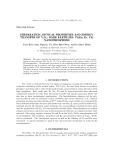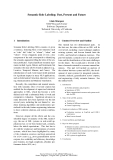
Future application potential
-
The Gymnosporia genus holds substantial potential for bioactive compound discovery, yet its phytochemical composition remains underexplored relative to its botanical diversity. This study provides the understanding of the chemical constituents of G. chevalieri, establishing a basis for future research on its potential applications and bioactive properties.
 10p
10p  vijiraiya
vijiraiya
 19-05-2025
19-05-2025
 1
1
 1
1
 Download
Download
-
Phosphorus (P) is essential for plant growth, but most of it in soil is insoluble and unavailable to plants. To increase crop yields, farmers use chemical fertilizers, causing soil pollution from the accumulation of insoluble P. Beneficial microorganisms called phosphorus-solubilizing microorganisms (PSMs) can change insoluble organic and inorganic phosphorus compounds into forms that plants can absorb. This article seeks to deepen knowledge of how PSM can improve plant growth, decrease soil phosphorus contamination, and contribute to the future of sustainable agriculture.
 11p
11p  viaburame
viaburame
 14-03-2025
14-03-2025
 5
5
 1
1
 Download
Download
-
This paper also discusses practical applications of object detection in satellite images, including environmental monitoring, resource management, and disaster response. Finally, the paper suggests potential future research directions, such as developing more efficient models, handling small objects, and leveraging diverse data sources.
 9p
9p  vihyuga
vihyuga
 20-02-2025
20-02-2025
 6
6
 1
1
 Download
Download
-
This paper describes the preparation, optical properties and the role of the concentration of rare earth ions (RE: Eu, Er, Tb, Yb) as active centers in the energy transfer of Y2O3: RE nanophosphors. The materials are prepared by the combustion method using urea or glycine. Nanoparticles can be prepared with sizes ranging from 5 to 100 nm and can be estimated by high resolution TEM. Optimization of Eu and Er content in these nanophosphors was reported. The effect of energy transfer between Tb and Eu and the up-conversion between Er and Yb were studied.
 8p
8p  12120609
12120609
 01-06-2020
01-06-2020
 19
19
 1
1
 Download
Download
-
Semantic Role Labeling (SRL) consists of, given a sentence, detecting basic event structures such as “who” did “what” to “whom”, “when” and “where”. From a linguistic point of view, a key component of the task corresponds to identifying the semantic arguments filling the roles of the sentence predicates. Typical predicate semantic arguments include Agent, Patient, and Instrument, but semantic roles may also be found as adjuncts (e.g., Locative, Temporal, Manner, and Cause).
 1p
1p  hongphan_1
hongphan_1
 15-04-2013
15-04-2013
 61
61
 2
2
 Download
Download
CHỦ ĐỀ BẠN MUỐN TÌM

















